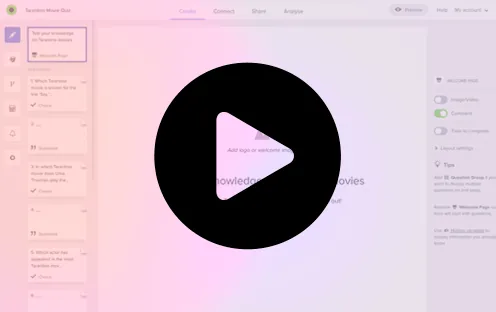4 min read

A Notion form builder is the fastest way to collect structured data (requests, leads, onboarding info, or internal intake) and send it straight into a Notion database. This guide is for operations, product, and customer-facing teams who want a clean workflow: build a form, share it, then manage everything inside Notion without manual copy-paste. You’ll learn what to look for (database sync, logic, validation, and automation) and compare five options—free and paid—including Responsly. If you’re also collecting feedback, see how teams run Notion surveys and when a survey vs questionnaire workflow makes more sense.
What to look for in Notion form builders
A good Notion-connected form tool should do more than “send rows” into a database:
- Reliable Notion database sync (mapping fields, handling updates, and multi-selects)
- Conditional logic (show/hide questions, branching, redirects)
- Data quality (required fields, validation, file uploads if needed)
- Automation (email alerts, Slack notifications, Zapier/Make support)
- Analytics and exports (especially if you run quizzes or surveys alongside forms)
Quick comparison: 5 best Notion form builders
| Tool | Best for | Key features | Pricing / free plan | Why choose it |
|---|---|---|---|---|
| Responsly | Teams that want forms + surveys/quizzes + analytics | Forms, surveys, quizzes, templates, reporting, workflow-ready exports | Check current pricing | Strong when you want collection + analysis, not just a Notion sync |
| Tally | Lightweight, Notion-style forms | Simple builder, conditional logic, generous free plan | Has a free plan | Great for fast internal intake and simple external forms |
| Typeform | Polished, high-conversion forms | Strong UX, logic, integrations | Limited free plan | Best when design and completion rate matter |
| Jotform | Advanced fields and complex forms | Templates, payments, file uploads, approvals | Has a free plan | Good for operational processes and richer form schemas |
| Formstack | Enterprise workflows and compliance | Workflow automation, approvals, security controls | Paid | Best for regulated teams and multi-step processes |
Responsly
Responsly is a practical choice if you want Notion-connected forms, plus the ability to run surveys and quizzes and analyze results in one place. That’s useful when your “form” is actually part of a broader workflow (onboarding, customer feedback loops, employee pulse check-ins, or training assessments).
- Learn more about building Notion-connected workflows with Notion forms and Responsly surveys.
- If your goal is feedback measurement, start with how to ask good survey questions and then automate collection.
Tally
Tally is popular with Notion users because the editing experience feels familiar. It’s well-suited for simple requests and intake flows where you want a clean form quickly, with basic logic and straightforward database-style data.
Learn more on Tally’s website.
Typeform
Typeform is a good fit when form completion rate and UX are priorities (customer-facing forms, lead capture, and branded experiences). It’s not “Notion-first,” but many teams connect responses into Notion via automation.
Learn more on Typeform’s website.
Jotform
Jotform is a strong option when you need richer data collection: file uploads, complex fields, templates, and operational workflows (for example, intake + approvals). It’s a common choice for teams that treat Notion as the system of record and want consistent submissions.
Learn more on Jotform’s website.
Formstack
Formstack is geared toward larger organizations that need advanced workflow automation and stronger governance. If you’re routing submissions through multiple steps (approvals, handoffs, compliance) before they end up in Notion, this category of tool can be worth the cost.
Learn more on Formstack’s website.
How Notion integrations help your team
When you connect forms to Notion, you typically get three practical benefits:
- Centralized tracking: every submission becomes a database item you can assign, tag, and prioritize.
- Operational workflows: use Notion views and automations to manage intake (triage, owners, statuses).
- Faster reporting: keep your form pipeline in the same workspace as projects and documentation.
If you also need feedback measurement and analysis (not just collection), consider pairing forms with surveys and quizzes. Responsly supports that end-to-end workflow—see forms and quizzes for examples.







